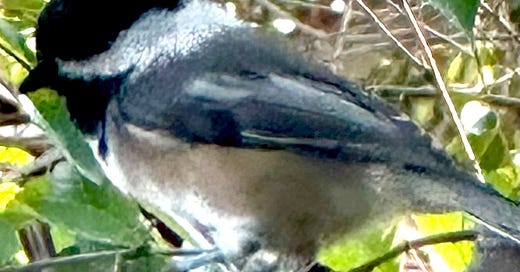Since my earliest memories, I’ve been fascinated by languages other than my own. As a child spending summers with my grandmother, I checked out library books in Braille and tried to teach my fingers to understand the raised bumps. I spent one elementary school year attending a French immersion school, and when I reached high school I enrolled in everything that would fit in my schedule: Latin, French, German. After college I spent a summer in Nicaragua living with a delightful family and speaking only Spanish. Now that my full-time work is building Indigenous language resources, I feel back at home in the discomfort of trying to communicate outside of the realm of English.
Lately the concept of language, in my mind, has evolved to include animal language. But of course! You can’t listen to birds and not realize they’re speaking to each other. Yesterday I read/listened to this delightful article (with audio!) by Amy Martin1 in part about the language of fish!! (WITH AUDIO!!!) I’ve also been devouring Eavesdropping on Animals by George Bumann, a really enjoyable scientific read that doubles as a how-to.
Some English words for birds are onomatopoeic - meaning their names sound like what they say. A phoebe, for example, or a bob-white2. Most important to me in particular is the chickadee. If you’ve ever heard and identified one, you’ll know that “chickadee” is one of the things these tiny birds say. I’m writing a field note on chickadee language, and have learned some fascinating facts about chickadee songs and calls. You may know that the “chickadee” is typically a warning and the number of “dees” on the end corresponds to the magnitude of the danger. But did you know the same call is used when a chickadee finds a new food source? Ornithologists posit that both calls function to bring chickadees together, either for safety-in-numbers3 or for sustenance. The loud fee-bee call (or “cheeseburger,” a sound-description I will never understand) is a male staking his territory, according to scientists.
But maybe there’s a time for us to just listen, and not try to analyze and label everything animals do. Sure, it’s fun to know that a chickadee-DEE-DEE-DEE! might suggest there’s a cat nearby, but also, this is the chickadee’s day. It is her existence, and I believe we humans and relatives can co-exist via simple acceptance often better than we can through analysis.
Besides listening more carefully to their language, I’ve also been learning the word for chickadee in as many Indigenous languages as I can. Many of these languages are similar in their naming convention, naming the bird after its sound. The Ojibwemowin word for chickadee, for example, is beautiful and descriptive: gijigijigaaneshiinh. You can hear it here. My language partners have also shared the name-words in Crow, Blackfoot, Salish, Cree.
As a person with only one functioning ear, I’ve long thought the good ear compensated for the weak ear merely in terms of its sensitivity to sound. But Bumann mentions his own hearing loss and how he recognizes that his hearing of some frequencies isn’t necessarily better, but that it’s more attuned to certain sounds. He says he might hear a car driving down a gravel road, where a friend might not register it at all, for example. I love this idea, that not only does my good ear physically work better, it’s more thoughtful too. It doesn’t just hear, it listens. Single-sided hearing loss makes it nearly impossible for me to pinpoint the location of a sound, but I can identify over 50 birds by their call or song, and maybe this is why. Now I want to learn more about my more-than-human relatives, not only through reading and observing, but by tuning my ear to their language.
As I sat here typing, I heard a tseet tseet and looked toward my freshly filled bird feeder. Costco has this great mix of sunflower seeds and millet, so even tiny birds have something for their tweezer beaks to nab. Right there on the perch: a chickadee, picking out bits of millet and flying back to his mate. Had I not picked up and recognized his tseet, a specific sound belonging to his language, I wouldn’t have seen my friend, the chickadee, on this stunning April morning.
Thank you, Caroline Kurtz, for sending it to me. What a blessing!
Which I grew up hearing, but did not know it is a ground bird until I saw a taxidermied one at the Field Museum in Chicago last spring. I was…stunned.
or for mobbing. I would love to see a chickadee mob my cat.




